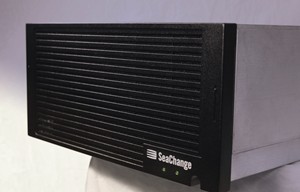SeaChange To Serve Up Web Video
The smarter way to stay on top of the multichannel video marketplace. Sign up below.
You are now subscribed
Your newsletter sign-up was successful
Looking to capitalize on the movement toward "TV Everywhere" services, SeaChange International has developed a video-on-demand server -- dubbed the Universal Media Streamer -- that serves traditional VOD as well as Web and mobile video formats.
"This is the first server we're delivering that is also able to stream HTTP," said Lev Vaitzblit, SeaChange's vice president of engineering, servers and storage.
The Universal Media Stream, or UMS, also delivers twice the stream capacity of SeaChange's current generation of flash-based memory servers. Overall, the UMS can deliver 20 Gigabits per second of concurrent video streams, or up to 5,000 standard-definition video streams, in a one-rack-unit form factor.
The UMS is scheduled to be available in the second half of 2010. The platform, which will run on a Linux operating system, adds integrated support for multiple streaming formats such as constant- and variable-bit-rate SD and HD, HTTP and Adobe Flash. The UMS will be available in 3- and 6-Terabyte configurations that can store up to 1,500 and 3,000 hours of SD MPEG-2 video, respectively, the company said.
In addition, SeaChange is announcing the Universal MediaLibrary (UML), which provides up to 144 Terabytes of raw storage in a five-rack-unit storage array. One UML array can pack in 72 drives, configured with either SAS or SATA drives.

"We're targeting the UML for unified storage for three-screen delivery," Vaitzblit said. "The challenge is in the packaging -- how you cram that much spinning disk into a little box."
The UML chassis design comprises six blades that are serviceable even while operational. Each blade module contains 12 top-load drive slots that enable simple drive replacement without impacting operations.The UML is currently shipping.
The smarter way to stay on top of the multichannel video marketplace. Sign up below.
Both products will be featured at the 2010 NAB Show from April 12-15. Also at NAB, SeaChange will introduce a broadcast version of the UML, which is an IP hub optimized for tapeless infrastructures that can function as a play-to-air server and production storage platform for non-linear editing systems.
